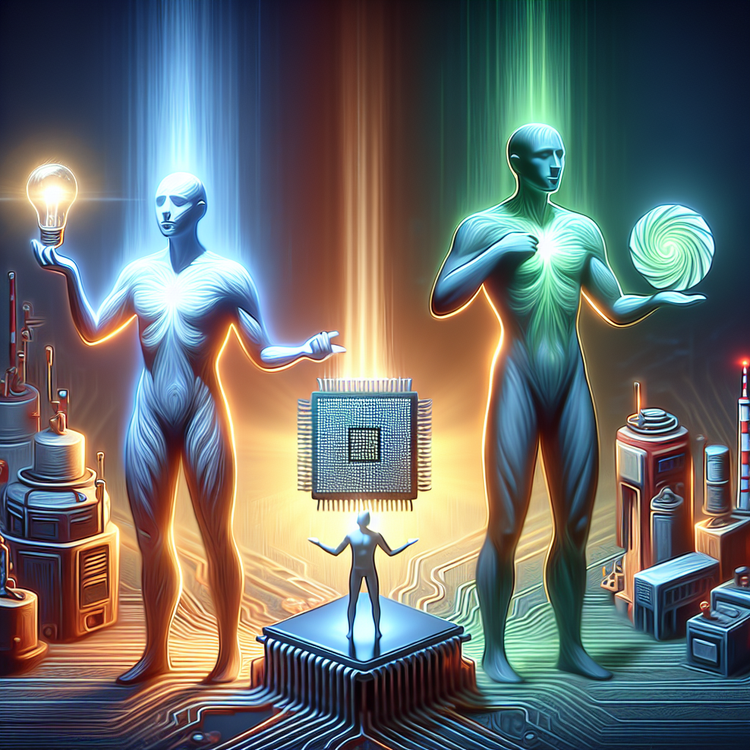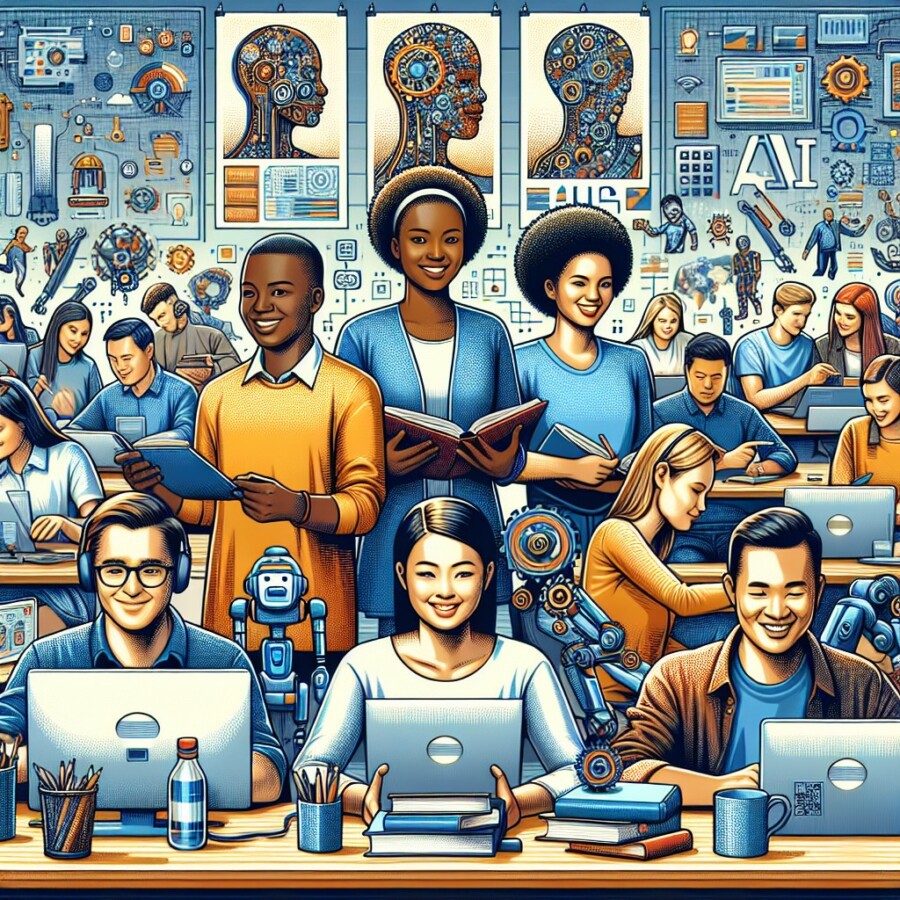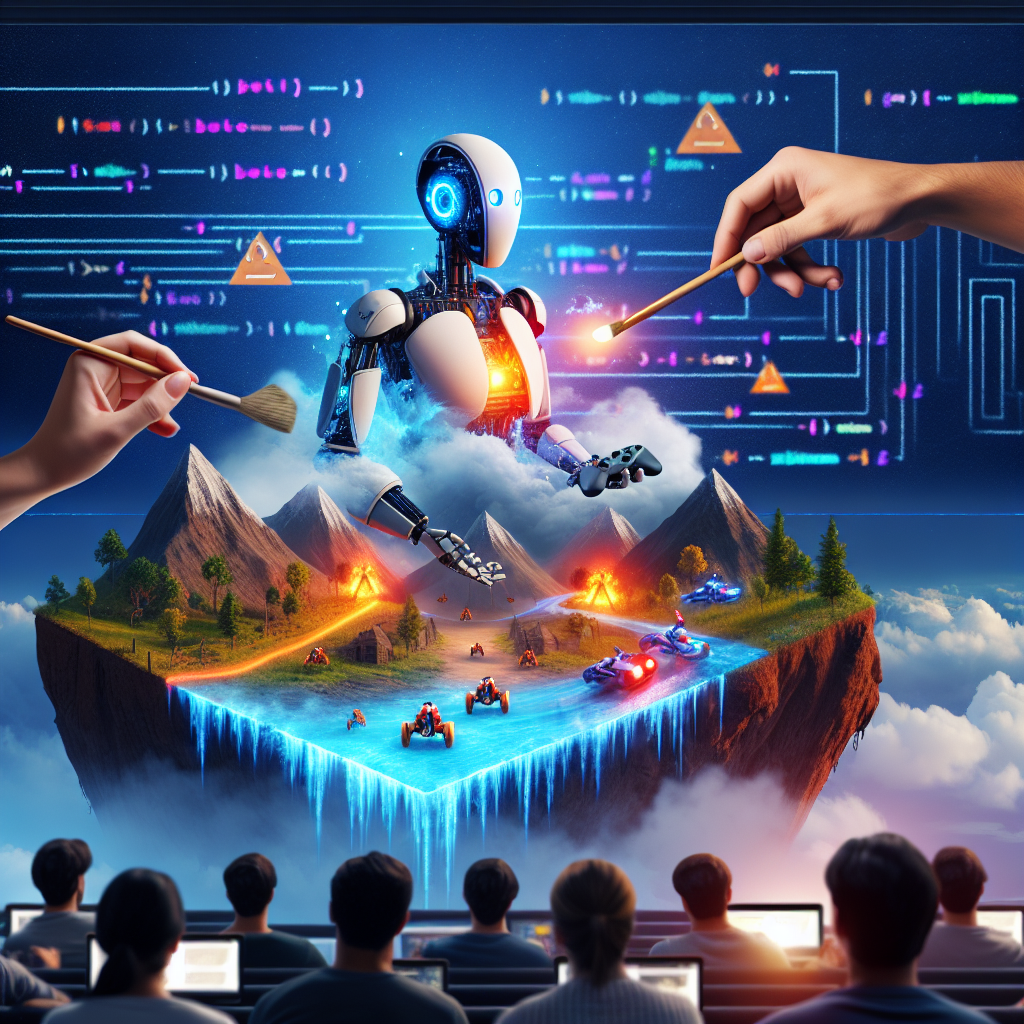The founder and CEO of Nvidia, Jensen Huang, expressed confidence in the safety of Artificial Intelligence (AI) development. Despite the ongoing debate surrounding the ethics of AI, Huang believes that technology will be kept safe through the collective efforts of professionals worldwide. His remarks come in the wake of the controversy surrounding OpenAI, a prominent AI company, which highlighted the influence of commercial competition on the development of AI systems. However, Microsoft, one of Nvidia’s top investors, denied that the disagreement was related to safety concerns. Nvidia’s AI chips have experienced high demand, leading to a significant increase in the company’s value.
While Chinese telecoms firm Huawei has also entered the AI chip market, Huang remains unfazed by the competition. He believes that competition is beneficial for advancing technology and making contributions to society. Nvidia currently dominates over 90% of China’s AI chip market, with historical revenue coming from China. However, the company expects a decline in sales due to US export restrictions aimed at curbing China’s progress in AI. Nvidia is working closely with the US government to ensure compliance with current regulations for chips sold in China.
Despite strained relations between the US and China, the Asia-Pacific region remains crucial to Nvidia’s supply chain. Huang emphasized the complexity of Nvidia’s Graphics Processing Unit (GPU), which consists of various components from different countries. He highlighted the strategic importance of AI and Nvidia’s collaboration with the Singapore government on projects such as the Sealion language model and the country’s overall AI strategy. Singapore’s growing market, numerous AI start-ups, and role as a data center hub make it an attractive location for investment.
Huang believes that each country now aims to build its own foundation to support its start-ups and industries, replicating the success of American internet companies. This global trend underscores the recognition of AI as a vital component of national strategies. As Nvidia continues to expand its presence in Singapore and collaborate with the government, Huang envisions a strong foundation that will benefit various industries and foster competition worldwide.
Original news source: Confident about safety of AI: Nvidia CEO Jensen Huang (BBC)
Listen:
Slow
Normal
Fast
Group or Classroom Activities
Warm-up Activities:
– News Summary
Instructions:
Divide the class into small groups. Give each group a few minutes to read the article. Then, ask each group to summarize the main points of the article in a short news summary. They should focus on the key information and use their own words to convey the main ideas. Afterward, have each group share their summaries with the class.
– Opinion Poll
Instructions:
Ask the class to form pairs or small groups. Assign each group a specific question related to the article, such as “Do you agree with Jensen Huang’s belief in the safety of AI development?” or “Do you think competition is beneficial for advancing technology?” Give the groups a few minutes to discuss their opinions and come up with reasons to support their answers. Then, have each group present their opinions to the class and lead a short discussion.
– Vocabulary Pictionary
Instructions:
Select 10-15 vocabulary words from the article that may be unfamiliar to the students. Write each word on a separate piece of paper or index card. Divide the class into two teams. One student from each team comes to the front of the class and picks a word without showing it to their team. They then have one minute to draw a picture representing the word while their team tries to guess what it is. The team that guesses correctly earns a point. Continue until all the words have been used, and then tally up the points to determine the winning team.
– Pros and Cons
Instructions:
Divide the class into two groups. Assign one group to come up with the pros of AI development, while the other group should come up with the cons. Give the groups a few minutes to brainstorm and write down their ideas. Then, have each group present their arguments to the class. Encourage a respectful and balanced discussion, allowing students to contribute their own thoughts and opinions.
– Future Predictions
Instructions:
Ask each student to individually write down three predictions about the future of AI development based on the information in the article. They can make predictions about the impact of AI on society, technological advancements, or any other related topic. Afterward, have students pair up and share their predictions with each other. Finally, bring the class together for a discussion, allowing students to share their predictions with the whole group and discuss the likelihood and potential implications of each prediction.
Comprehension Questions:
1. What is Jensen Huang’s opinion on the safety of AI development?
2. What controversy surrounded OpenAI and why?
3. How has the demand for Nvidia’s AI chips affected the company’s value?
4. How does Huang feel about the competition from Huawei in the AI chip market?
5. What percentage of China’s AI chip market does Nvidia currently dominate?
6. Why does Nvidia expect a decline in sales in China?
7. Why is the Asia-Pacific region crucial to Nvidia’s supply chain?
8. What projects has Nvidia collaborated on with the Singapore government?
Go to answers ⇩
Listen and Fill in the Gaps:
The founder and CEO of (1)______, Jensen Huang, expressed confidence in the safety of Artificial Intelligence (AI) development. Despite the ongoing debate surrounding the ethics of AI, Huang (2)______ that technology will be kept safe through the collective efforts of (3)______ worldwide. His remarks come in the wake of the controversy surrounding OpenAI, a prominent AI company, which highlighted the influence of commercial competition on the development of AI systems. However, Microsoft, one of Nvidia’s top investors, denied that the disagreement was (4)______ to safety concerns. Nvidia’s AI chips have (5)______ high (6)______, leading to a significant increase in the company’s value.
While Chinese telecoms firm Huawei has also entered the AI chip market, Huang (7)______ unfazed by the competition. He believes that competition is beneficial for advancing (8)______ and making contributions to society. Nvidia currently dominates over 90% of China’s AI chip market, with historical revenue coming from China. However, the company expects a decline in sales due to US export restrictions aimed at curbing China’s progress in AI. Nvidia is working closely with the US government to ensure (9)______ with current regulations for chips sold in (10)______.
Despite strained relations between the US and China, the Asia-Pacific region remains crucial to Nvidia’s supply chain. Huang emphasized the complexity of Nvidia’s (11)______ Processing Unit (GPU), which consists of various components from different countries. He highlighted the strategic importance of AI and Nvidia’s collaboration with the Singapore government on projects such as the (12)______ language model and the country’s overall AI strategy. Singapore’s growing market, numerous AI start-ups, and role as a data center hub make it an attractive location for investment.
Huang believes that each country now aims to build its own foundation to support its start-ups and industries, (13)______ the (14)______ of American internet companies. This global trend underscores the recognition of AI as a vital component of national strategies. As Nvidia continues to expand its (15)______ in Singapore and collaborate with the government, Huang envisions a strong foundation that will benefit various industries and (16)______ competition worldwide.
Go to answers ⇩
Discussion Questions:
Students can ask a partner these questions, or discuss them as a group.
1. What is your opinion on the safety of Artificial Intelligence development?
2. How would you feel if your country’s progress in AI was restricted by export regulations?
3. Do you think competition is beneficial for advancing technology? Why or why not?
4. How do you think the ongoing debate surrounding the ethics of AI will impact its development?
5. What is your perspective on the influence of commercial competition on the development of AI systems?
6. Do you believe that each country should aim to build its own foundation to support start-ups and industries in AI? Why or why not?
7. How important do you think AI is as a component of national strategies?
8. What is the role of AI in your country’s overall strategy?
9. How do you think the collaboration between Nvidia and the Singapore government will benefit various industries?
10. Do you think it is necessary for companies like Nvidia to work closely with governments? Why or why not?
11. How do you think the strained relations between the US and China will impact the AI chip market?
12. What is your opinion on the dominance of Nvidia in China’s AI chip market?
13. How would you feel if your country’s AI start-ups were replicating the success of American internet companies?
14. Do you believe that technology can be kept safe through the collective efforts of professionals worldwide? Why or why not?
15. How do you think AI will shape the future of society?
Individual Activities
Multiple Choice Questions:
1. Who is the founder and CEO of Nvidia?
(a) Bill Gates
(b) Elon Musk
(c) Mark Zuckerberg
(d) Jensen Huang
2. What is the controversy surrounding OpenAI related to?
(a) Safety concerns
(b) Commercial competition
(c) Ethics of AI
(d) None of the above
3. Which company is one of Nvidia’s top investors?
(a) Microsoft
(b) Huawei
(c) OpenAI
(d) Singapore government
4. What percentage of China’s AI chip market does Nvidia currently dominate?
(a) 50%
(b) 75%
(c) Less than 10%
(d) Over 90%
5. What is the reason for the expected decline in Nvidia’s sales in China?
(a) Lack of demand
(b) Competition from Huawei
(c) US export restrictions
(d) Safety concerns
6. Who is Nvidia collaborating with on projects such as the Sealion language model?
(a) OpenAI
(b) Huawei
(c) Singapore government
(d) Microsoft
7. What is the strategic importance of AI according to Huang?
(a) Vital component of national strategies
(b) Boosting sales for Nvidia
(c) Ensuring compliance with regulations
(d) None of the above
8. What does Huang envision for Nvidia’s presence in Singapore?
(a) Dominating the AI chip market
(b) Strong foundation benefiting various industries
(c) Collaboration with OpenAI
(d) None of the above
True or False Questions:
1. Huang is affected by the competition from Chinese telecoms firm Huawei in the AI chip market.
2. Huang believes that technology will be kept safe through the collective efforts of professionals worldwide.
3. Nvidia currently dominates over 90% of China’s AI chip market, with historical revenue coming from China.
4. The founder and CEO of Nvidia, Jensen Huang, expressed doubt in the safety of AI development.
5. Microsoft, one of Nvidia’s top investors, denied that the disagreement with OpenAI was related to safety concerns.
6. Nvidia’s AI chips have experienced high demand, leading to a significant increase in the company’s value.
7. Nvidia expects an increase in sales due to US export restrictions aimed at curbing China’s progress in AI.
8. Nvidia is not working closely with the US government to ensure compliance with current regulations for chips sold in China.
Go to answers ⇩
Write a Summary:
Write a summary of this news article in two sentences.
Writing Questions:
Answer the following questions. Write as much as you can for each answer.
1. What is Jensen Huang’s opinion on the safety of AI development?
2. What controversy surrounding OpenAI did Jensen Huang’s remarks address?
3. How has the demand for Nvidia’s AI chips affected the company’s value?
4. How does Jensen Huang view the competition from Huawei in the AI chip market?
5. What is the strategic importance of Singapore to Nvidia’s supply chain and AI strategy?
Answers
Comprehension Question Answers:
1. Jensen Huang is confident in the safety of AI development and believes that technology will be kept safe through the collective efforts of professionals worldwide.
2. The controversy surrounding OpenAI was related to the influence of commercial competition on the development of AI systems. However, Microsoft, one of Nvidia’s top investors, denied that the disagreement was related to safety concerns.
3. The high demand for Nvidia’s AI chips has led to a significant increase in the company’s value.
4. Huang remains unfazed by the competition from Huawei in the AI chip market and believes that competition is beneficial for advancing technology and making contributions to society.
5. Nvidia currently dominates over 90% of China’s AI chip market.
6. Nvidia expects a decline in sales in China due to US export restrictions aimed at curbing China’s progress in AI.
7. The Asia-Pacific region is crucial to Nvidia’s supply chain because it is where the company sources various components for its Graphics Processing Unit (GPU).
8. Nvidia has collaborated with the Singapore government on projects such as the Sealion language model and the country’s overall AI strategy.
Go back to questions ⇧
Listen and Fill in the Gaps Answers:
(1) Nvidia
(2) believes
(3) professionals
(4) related
(5) experienced
(6) demand
(7) remains
(8) technology
(9) compliance
(10) China
(11) Graphics
(12) Sealion
(13) replicating
(14) success
(15) presence
(16) foster
Go back to questions ⇧
Multiple Choice Answers:
1. Who is the founder and CEO of Nvidia?
Answer: (d) Jensen Huang
2. What is the controversy surrounding OpenAI related to?
Answer: (b) Commercial competition
3. Which company is one of Nvidia’s top investors?
Answer: (a) Microsoft
4. What percentage of China’s AI chip market does Nvidia currently dominate?
Answer: (d) Over 90%
5. What is the reason for the expected decline in Nvidia’s sales in China?
Answer: (c) US export restrictions
6. Who is Nvidia collaborating with on projects such as the Sealion language model?
Answer: (c) Singapore government
7. What is the strategic importance of AI according to Huang?
Answer: (a) Vital component of national strategies
8. What does Huang envision for Nvidia’s presence in Singapore?
Answer: (b) Strong foundation benefiting various industries
Go back to questions ⇧
True or False Answers:
1. Huang is affected by the competition from Chinese telecoms firm Huawei in the AI chip market. (Answer: False)
2. Huang believes that technology will be kept safe through the collective efforts of professionals worldwide. (Answer: True)
3. Nvidia currently dominates over 90% of China’s AI chip market, with historical revenue coming from China. (Answer: True)
4. The founder and CEO of Nvidia, Jensen Huang, expressed doubt in the safety of AI development. (Answer: False)
5. Microsoft, one of Nvidia’s top investors, denied that the disagreement with OpenAI was related to safety concerns. (Answer: True)
6. Nvidia’s AI chips have experienced high demand, leading to a significant increase in the company’s value. (Answer: True)
7. Nvidia expects an increase in sales due to US export restrictions aimed at curbing China’s progress in AI. (Answer: False)
8. Nvidia is not working closely with the US government to ensure compliance with current regulations for chips sold in China. (Answer: False)
Go back to questions ⇧















